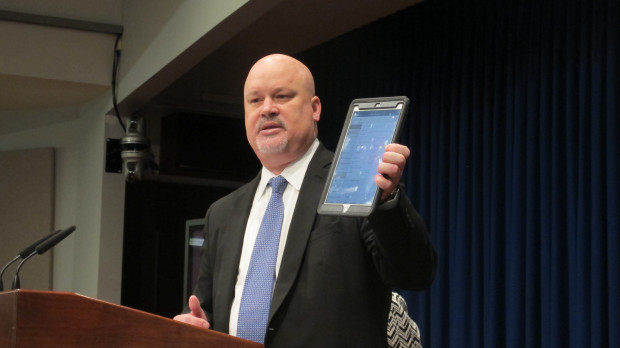
Scott Perry, Deputy Secretary of DEP's Office of Oil and Gas Management holds up an iPad.
Marie Cusick / StateImpact Pennsylvania


Scott Perry, Deputy Secretary of DEP's Office of Oil and Gas Management holds up an iPad.
Marie Cusick / StateImpact Pennsylvania

Marie Cusick / StateImpact Pennsylvania
Scott Perry, Deputy Secretary of DEP's Office of Oil and Gas Management holds up an iPad.

Marie Cusick / StateImpact Pennsylvania
Scott Perry, Deputy Secretary of DEP’s Office of Oil and Gas Management holds up an iPad.
Pennsylvania regulators are slowly playing catch up when it comes to technology.
After years of yearning for the latest digital tools, the state Department of Environmental Protection was recently able to send its oil and gas inspectors out into the field with iPads. The change has cut down the time and tedium of filing paper reports.
Scott Perry, head of DEP’s Office of Oil and Gas Management, said inspectors are using a new app (created in conjunction with PennDOT) and said it has helped increase productivity — amounting to more than $500,000 annually, or about the cost of having six new inspectors.
The staff of the Office of Oil and Gas Management has been trending downward in recent years, however. It had 227 employees two years ago. It now has 190.
Holding an iPad up at a press conference Monday, Perry said the agency is accomplishing more with less.
“At a time when the agency is working under constrained resources, with an ever-expanding set of responsibilities, DEP should be commended for improving performance and accountability, while saving costs,” he said.
In another advance, the Rachel Carson State Office Building, where DEP is headquartered in Harrisburg, recently got Wi-Fi. Two years ago, staff got permission to add apps to their government-issued iPhones.
The department says it is still working to speed up the notoriously slow internet connections that weigh down its regional offices. At a state budget hearing in 2016, one legislator complained he’d heard a dial-up modem on a conference call with the department, which he remarked was “obsolete in 2004.”
StateImpact Pennsylvania is a collaboration among WITF, WHYY, and the Allegheny Front. Reporters Reid Frazier, Rachel McDevitt and Susan Phillips cover the commonwealth’s energy economy. Read their reports on this site, and hear them on public radio stations across Pennsylvania.
(listed by story count)
StateImpact Pennsylvania is a collaboration among WITF, WHYY, and the Allegheny Front. Reporters Reid Frazier, Rachel McDevitt and Susan Phillips cover the commonwealth’s energy economy. Read their reports on this site, and hear them on public radio stations across Pennsylvania.
Climate Solutions, a collaboration of news organizations, educational institutions and a theater company, uses engagement, education and storytelling to help central Pennsylvanians toward climate change literacy, resilience and adaptation. Our work will amplify how people are finding solutions to the challenges presented by a warming world.